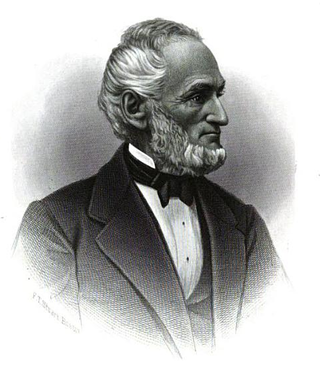
Amasa Walker was an American economist and United States Representative. He was the father of Francis Amasa Walker.

Joseph Milner Wightman was an American politician who, from 1861 to 1863, served as the seventeenth Mayor of Boston, Massachusetts.
The Boston mayoral election of 1859 saw the reelection of Frederic W. Lincoln Jr. to a third consecutive term. It was held on December 12, 1859.
The Boston mayoral election of 1861 took place on Monday, December 9, 1861, and saw the reelection of Joseph Wightman.
The 1868 Boston mayoral election was held on December 8, 1868 and saw Frederic W. Lincoln Jr. be returned to the mayoralty for a fourth non-consecutive term, unseating incumbent mayor Joseph Wightman.
The 1863 Boston mayoral election was held on December 14, 1863 and saw Frederic W. Lincoln Jr. reelected to a fifth overall term.
The 1864 Boston mayoral election was held on December 12, 1864 and saw Frederic W. Lincoln Jr. reelected to a sixth overall term.
The Boston mayoral election of 1865 saw Frederic W. Lincoln Jr. reelected to a seventh overall term.
The Boston mayoral election of 1866 saw the election of Republican Party nominee Otis Norcross.
The Boston mayoral election of 1867 saw the election of Democratic Party nominee Nathaniel B. Shurtleff, who unseated Republican incumbent Otis Norcross.
The Boston mayoral election of 1869 saw the reelection of Nathaniel B. Shurtleff to a third consecutive term.
The Boston mayoral election of 1870 saw the election of Democratic Party nominee William Gaston over Republican Party nominee George O. Carpenter.
The Boston mayoral election of 1871 saw the reelection of incumbent Democrat William Gaston, who defeated Republican nominee Newton Talbot.
The Boston mayoral election of 1872 saw the election of Republican nominee Henry L. Pierce, who narrowly unseated incumbent Democratic mayor William Gaston.
The Boston mayoral election of 1876 saw the election of Democratic Party nominee Frederick O. Prince over Republican Party nominee Nathaniel Jeremiah Bradlee.
The Boston mayoral election of 1877 saw the election of Republican nominee Henry L. Pierce, who unseated incumbent Democratic mayor Frederick O. Prince.
The Boston mayoral election of 1878 saw Republican Frederick O. Prince elected to return the mayoralty for a second nonconsecutive term. He defeated Democratic nominee Charles R. Codman and Greenback contender Davis J. King.
The Boston mayoral election of 1880 saw incumbent mayor Frederick O. Prince reelected to his fourth overall term, defeating Republican nominee Solomon B. Stebbins.
The Boston mayoral election of 1887 saw the reelection of Hugh O'Brien (a Democrat to a fourth consecutive term, defeating Republican nominee Thomas N. Hart.
The Boston mayoral election of 1853–1854 saw the election of Citizens Union Party nominee Jerome V. C. Smith. The election took three votes, as no candidate secured the needed majority in the first two attempts. Incumbent Whig mayor Benjamin Seaver had run for reelection as his party’s nominee in the first vote, but opted not to compete in the second or third votes.




